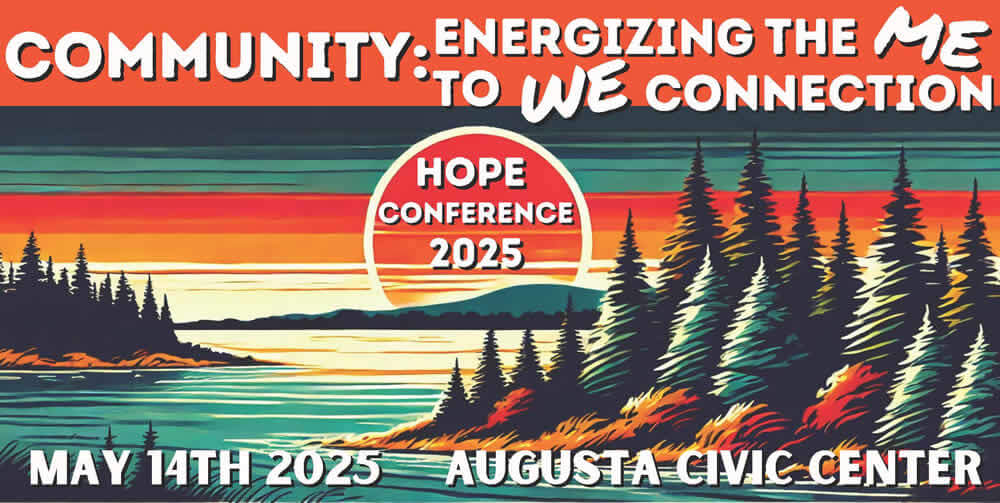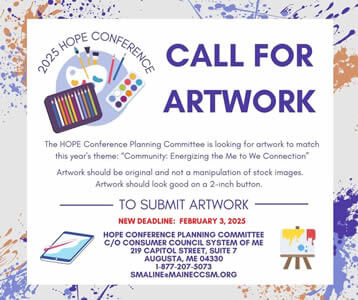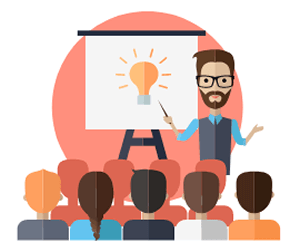
HOPE Conference 2025
COMMUNITY: Energizing the ME to WE Connection
Wednesday, May 14, 2025, 8:00-4:00, Augusta Civic Center
The HOPE Conference is a Statewide Recovery/Wellness Conference for persons in recovery from substance use and mental health challenges and Service Providers. It was created to help participants gain a greater understanding of what recovery wellness looks like from the many paths and different perspectives on the journey of life.
Call for Artwork

Would you like to design this year’s theme logo? Now is your chance!
The HOPE Conference Planning Committee is looking for artwork to match this year’s theme: “Community: Energizing the Me to We Connection”
Artwork should be original and not a manipulation of stock images. Artwork should look good on a 2-inch button.
The chosen design will be used on all conference materials, website, and social media!
Deadline to Submit Artwork: February 3, 2025
Submit Your Artwork to:
Hope Conference Planning Committee
c/o Consumer Council System of Maine
219 Capitol Street, Suite 7
Augusta, ME 04330
1-877-207-5073
[email protected]
Call for Presentations

Community: “Energizing the ME to WE Connection”
This year’s theme is meant to acknowledge the absolute need for personal (ME) recovery and wellness and the collective WE, the need to be in community which can be an important part of our journeys. Finally, the call to action to make our systems reflect the needs and values we have for a diversity of wellness and recovery supports for those with Substance Use and Mental Health Challenges. Please join the conversation and explore how this is or can be reflected in systems/services, our individual choices and journeys, and continuing to create a supportive, accepting, and vibrant community.
TRACKS
1) Personal Wellness/Recovery
2) Connections with Community
3) Impacting Systems
The HOPE Conference Committee is looking for individuals in recovery from substance use and mental health challenges to present workshops at the annual HOPE Conference. In appreciation of people’s time and expertise, all workshop presenters/panelists will receive a $100 stipend (if not paid by their employer), in addition to free registration.
Any peer or consumer is qualified to submit a proposal for a workshop at the conference. A peer may have a non-peer co-presenter. For our purposes, a peer is defined as a person who has received or is receiving mental health or substance use services and/or used peer support or holistic resources to support their recovery.
- The 75-minute timeframe presentation will include introductions, presentation material, a question and answer session, and an attendee evaluation of presentation.
- Attendees should leave with specific knowledge and skills about various aspects of the topic and how it relates to recovery and wellness.
- Presentations that introduce attendees to a specific service, practice, or strategy require the presenter to share evidence of effectiveness with attendees. This can include preliminary outcomes and evaluation findings.
- Presentations should provide attendees with educational value and refrain from promoting or selling a specific business or product
Workshop proposals should reflect the conference theme.
Deadline to submit: February 3, 2025
To submit a proposal, please complete the prepared fill-in form or otherwise provide the following information:
- Your name and contact info with a brief bio sketch.
- Why you would like to do a workshop at this conference.
- The title of your presentation, the track(s) it pertains to, and 2-3 learning objectives.
- Description of presentation (limit 2 pages)
- Will you have a PowerPoint presentation? Need handouts printed?
Email Your Proposal to:
Simonne Maline: smaline@maineccsm
Or Mail Your Proposal to:
Hope Conference Planning Committee
c/o Consumer Council System of Maine
219 Capitol Street, Suite 7
Augusta, ME 04330
1-877-207-5073
PDF & Word Presentation Proposal Form
PDF & Word Presentation Informational Sheet
How Would You Prepare a Presentation? EASY!
Tips for new presenters:
First, you would think about things that have supported or encouraged your recovery, keeping in mind the Tracks. Then you would think about how to share that experience with others.
For Example: Impacting Systems
Think about the systems that impact your recovery. The mental health system. The substance use treatment system. The criminal justice system. The health care system in general. Have your experiences in these systems served you well? Do you have ideas of how systems could work better? Impacting Systems is about skills and strategies that can bring change, so systems are more helpful and less oppressive. Perhaps you’ve testified at the legislature, organized or attended a protest, or done community organizing–and can share the skills and strategies you’ve learned. This is an opportunity for you to share your ideas, experiences, and skills to change systems.
For Example: Personal Wellness/Recovery
Think of something which has supported your journey in recovery and wellness or helped you define what wellness looks like for you. You could present your unique views and story about wellness and transformation and maybe provide a resource list for connecting to wellness activities and other things that help as you move forward. Examples could be nature, yoga, support groups, creativity, or anything that has supported your overall wellness. Activities that you participate in may also relate to community and building relationships.
For Example: Connections with Community
Most of us during the pandemic no longer had access to normal ways of connecting with others in our communities. Perhaps you found ways to stay connected, learned different ways to meet your needs for community, or have ideas how to rebuild community as the pandemic eases. What does community mean and look like to you? How does it support your recovery and wellness? Whether it’s family, recovery communities, groups with common interests, etc., you could share your story and ideas for strengthening our connections with others. The workshop could include time for participants to discuss ways to reach out to join community groups, and ways to connect to others and form new friendships.
This conference event is designed for individuals in recovery, service providers, family members and community members to attend. The goals of the conference are for participants to gain a greater understanding of what recovery/wellness is from many paths and different perspectives on the journey of life. This conference will be a chance to learn from each other, network, and gain greater understanding about recovery and wellness.
You can use this checklist to make sure that your workshop meets the conference goals:
- Does my workshop offer an opportunity for others to grow and learn?
- Does my workshop introduce knowledge that others can apply in their own journey?
- Does my workshop provide resources for others?
- Does my workshop format accommodate different learning styles (visual, listening, interactive)?
- Does my workshop include my experience of recovery in relation to the topic I’m presenting?
- Does my workshop fit the theme and one of the Wellness Tracks?
